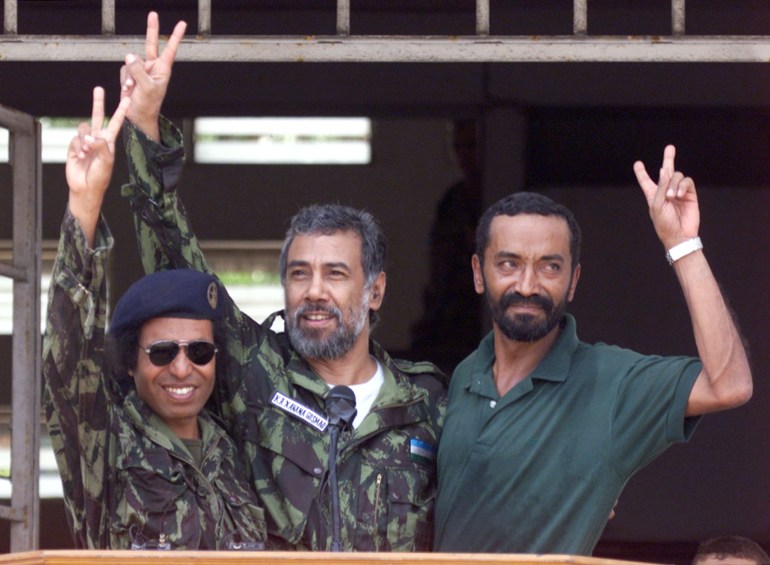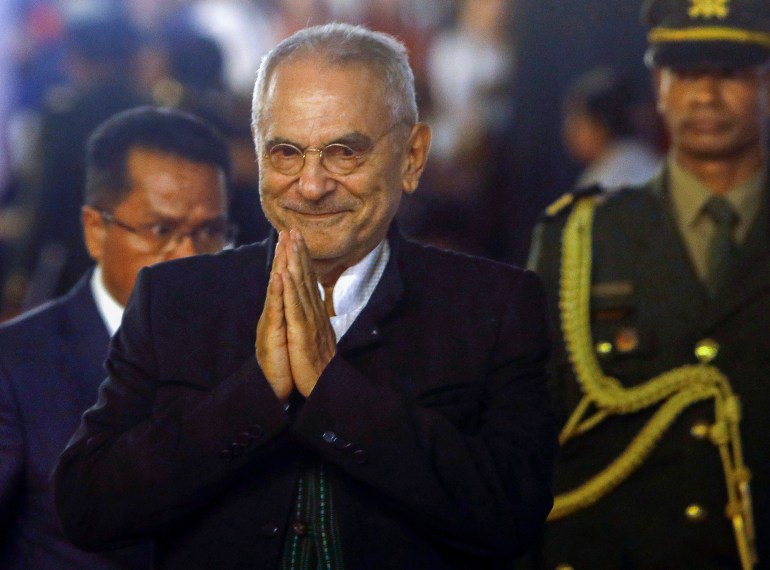East Timor looks to new president for generational change | Politics News
Cryptopolytech Public Press Pass
Title: East Timor looks to new president for generational change | Politics News
200000048 – World Newser
•| World |•| Online |•| Media |•| Outlet |
East Timor looks to new president for generational change | Politics News
Dili, East Timor – In the middle of his speech marking the 20th anniversary of East Timor’s restoration of independence, newly inaugurated president José Ramos-Horta stopped for a moment to tell the audience – more than 100 guests from around the world – that he had invited his “friends” to join the celebrations.
The gates at the opposite end of the presidential palace in the capital, Dili, swung open and a stream of children began running in as dignitaries, including Portuguese in the News” style=”color: blue;”>Portuguese President Marcelo Rebelo de Sousa, looked on.
Once the formalities were completed, Ramos-Horta invited the youngsters to join him on the grandstand. Children as young as five years old ran onto the stage and were greeted with hugs and kisses from the assortment of world leaders in attendance.
For Bella Galhos, a former presidential adviser and an LGBTQ and women’s rights activist who campaigned for Ramos-Horta, it was a testament to the new president’s pledge to run an open administration.
“It’s not something that he put on just to show to the world,” Galhos told Al Jazeera. “He meant it and he has said that the [presidential] palace gates will not be closed again.”
But with 72-year-old Ramos-Horta symbolising a long line of revolutionary heroes who have dominated the political scene since the country restored its independence from Indonesia in 2002, calls are growing for the older generation to step aside and let younger leaders take charge.
Need for transition
Among those calling for generational change are KHUNTO, a youth-run party that occupies five seats in the national assembly and is part of the current coalition government. The party was founded with the goal of increasing the representation of young people in parliament.
“I think we still need national leaders like Ramos-Horta, but they need to have considerations for the younger generations,” Marito Magno, a national counsellor for KHUNTO, told Al Jazeera.
“There needs to be a transition. They should know that it’s time to hand over power to the new generation.”
Marito points to the third-place finish, among 16 candidates, of KHUNTO party leader and deputy prime minister Armanda Berta dos Santos in the presidential elections’ first round in March, as evidence of the strong support for a more youth-driven party.
Some resistance figures have stepped back from the limelight. Former independence leader turned president and prime minister, Xanana Gusmão, for one, chose not to be a guest of honour at the inauguration. When asked by Al Jazeera why he did not attend in an official capacity, he laughed and said he “can’t remember”.
Ramos-Horta said his old friend was “there in the crowd” but “didn’t want to draw attention to himself”.
While Gusmão did attend a handful of events over the course of the week, following a meeting with Ramos-Horta and Rebelo de Sousa on Saturday, he snuck out a side exit of the palace to avoid the media.
Gusmão’s ex-wife and East Timor’s former first lady Kirsty Sword Gusmão has also been calling for a younger class of leaders. She told Al Jazeera that figures like Gusmão and Ramos-Horta have “a very important role in mentoring a young generation” but this needs to be done in a “more organised way” for there to be real change.
However, Ramos-Horta believes that if the country had “such a thirst for a new generation …they would have been elected by now”.
While some of his peers may be taking a step back, Ramos-Horta has been welcomed back into the political spotlight with open arms, with his supporters praising his international connections and willingness to push boundaries in the Catholic-majority country.
During his inauguration address, he became the first East Timorese president to mention rights for the LGBT community. He also promised that his office will have “absolute gender balance”.
“I told the people working with me, ‘Don’t even bother coming in with excuses about not having women in the leadership because I will not buy it.’ And in the next elections, I will tell the leaders of the other parties, if you don’t want me to block appointments then come with gender balance,” he told Al Jazeera.

JIR/TAN
Network of friends
Ramos-Horta retired from politics in 2012 after serving as both president and prime minister of Southeast Asia’s youngest country. He had previously led East Timor’s 25-year fight for independence from Indonesia – work which won him the 1996 Nobel Peace Prize.
But, in March 2020, after nearly a decade working on independent projects, he was approached and asked to run as a candidate for one of the country’s two major parties, the National Congress for Timorese Reconstruction (CNRT).
Initially unsure, he eventually agreed, believing his predecessor Francisco Guterres, known more commonly as Lú Olo, had abused his constitutional powers and mishandled the economy, especially during the COVID-19 pandemic.
With the lowest gross domestic product (GDP) and GDP per capita in Southeast Asia, Ramos-Horta told Al Jazeera that he put his name forward because he believed he was the only person who could get the economy back on its feet, as well as restore a level of political stability. Ramos-Horta secured a victory in the second round of elections in April and was sworn into office a week ago.
The CNRT’s key condition for Ramos-Horta running was that, if elected, he would dissolve parliament to “restore constitutional order”, Gusmão, who founded the CNRT in 2007, told Agência Lusa at the time.
While Ramos-Horta initially accepted the requirement, he told Al Jazeera two days before his inauguration, that he no longer planned to call early elections because the country would be “paralysed for several months” and the “economic situation would get far worse”. He added that the rest of the party, including Gusmão, agreed and they are “now focusing on the elections in 2023”.

His ability to change his position on a key promise with little fallout is a skill that makes him revered by so many of his peers, both at home and abroad – even amid calls for younger voices in politics.
Former Serbian President Boris Tadic told Al Jazeera that he came to Dili for the inauguration for one reason – to support his “friend”. Adama Dieng, the UN special adviser on the prevention of genocide, similarly said that he attended to celebrate his “mentor”. Kailash Satyarthi, the 2014 Nobel Peace Prize winner, took five separate flights over two days in order to make it on time.
Ramos-Horta credits his friendships with international figures to his ability to “see people as people”. He told Al Jazeera that he sent “personal invitations” to many of his guests, texting them on the messaging application Whatsapp, ‘Hey, please come to my inauguration.’ And most of them did.
With so many international guests in attendance, the inauguration was an elaborate affair. Thousands of people gathered outside in Tasi-Tolu, in the western part of Dili, waiting for hours to cheer on the new president and celebrate the 20th anniversary of East Timor’s restoration of independence, which fell on the same day.
The only moment of slight trepidation was when outgoing president Lú Olo was late. The entire ceremony was paused for 20 minutes, until he finally arrived.
Questions over ASEAN
With Ramos-Horta’s strong relationships with international figures, there is hope that he will be able to boost East Timor’s international standing, especially when it comes to joining the Association of Southeast Asian Nations (ASEAN).
The last time Ramos-Horta served as president, joining ASEAN was one of his primary goals. But this time, he is more guarded.
“It’s still a big question mark as to whether Timor-Leste is ready to join ASEAN. I believe we will join ASEAN in the next year or two, but it has taken a long time and rightly so. There are still a lot of areas where we are very amateurish,” Ramos-Horta told Al Jazeera, pointing, as an example, to the government’s failure to follow through on Memorandums of Understanding with fellow ASEAN countries like Indonesia.
In his inauguration speech, he mentioned ASEAN only briefly, calling East Timor’s accession to the bloc “a national strategic objective” but saying little more on the subject.

It was noticeable that no ASEAN leaders flew in for the event. Cambodian Prime Minister Hun Sen, Indonesian President Joko Widodo, and Malaysian opposition leader Anwar Ibrahim had all said they would attend but pulled out at the last minute for various reasons.
Part of Ramos-Horta’s interest in joining ASEAN is to help with the crisis in Myanmar. The fellow Southeast Asian country has been plunged into turmoil since the military seized power in a coup in early 2021.
One guest of honour at the inauguration was Yohei Sasakawa, the chair of the Nippon Foundation and Japan’s Special Envoy for National Reconciliation in Myanmar. Ramos-Horta said that in their meeting on Saturday, the two men spoke mostly about Myanmar, with Sasakawa pushing for dialogue between stakeholders as a solution and East Timor’s new president advocating for targeted sanctions instead.
The first week of Ramos-Horta’s presidency has already put his unique skill set and extensive connections with the international community on full display. But, when it comes to empowering a new generation of leaders, it remains to be seen what he, and his fellow revolutionaries, have planned.
While he has claimed to be the only leader who can “pacify the country and mobilise international investments”, even his most ardent supporters believe he should use his final term to help show that East Timor has leadership talent beyond its former freedom fighters.
“We cannot go on taking the country forward with the domination of men, and especially men from the jungle,” said activist Galhos, referring to those who fought for the country’s independence.
“They are not taking the country far. I really think we could see younger leaders [in the next five years] but it depends on how we work to change the perspective of people – the majority of people are still looking up to these key figures as the only leaders in the country.”
‘News of the Day’ content, as reported by public domain newswires.
Source Information (if available)
It appears the above article may have originally appeared on www.aljazeera.com and has been shared elsewhere on the internet, repeatedly. News articles have become eerily similar to manufacturer descriptions.
We will happily entertain any content removal requests, simply reach out to us. In the interim, please perform due diligence and place any content you deem “privileged” behind a subscription and/or paywall.
First to share? If share image does not populate, please close the share box & re-open or reload page to load the image, Thanks!



